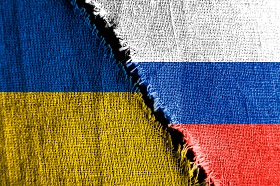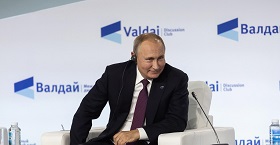The significance and possible consequences of Ukraine-Gate unfolding in Washington can be assessed in different ways. The suggestion that Donald Trump is trying to use the “Ukraine card” to drive Democrat Joe Biden out of the 2020 presidential race seems absurd to his supporters, but quite convincing to his opponents. Without going into the details of the ongoing scandal, let us try to assess what it means for Moscow, and how it might influence Russia–U.S. and Russia–Ukraine relations.
The only way a weakened Trump and a weakened Zelensky would play into the hands of the Kremlin is if the aim of Russia’s policy is to maintain the current status quo in Donbass indefinitely. Of course, in the five years since the conflict in Eastern Ukraine began, certain forces that are interested in this very scenario have emerged and gained a foothold in Russia. However, maintaining the status quo would not only mean a humanitarian disaster in Eastern Ukraine and the complete breakdown of Russia–Ukraine relations. It would also mean the further deepening of the current schism in Europe, with Russia and the “aggregate West” drifting yet further apart. And this at a time when the growing burden of global and regional problems demands that bridges be built as quickly as possible. “Time is a bad ally,” as Winston Churchill used to say. And time is against both Kiev and Moscow in the current crisis.
If the aim of Russian policy is to resolve the Donbass issue by finding a compromise solution, then the Russian leadership has no reason to rejoice at Ukraine-Gate. Quite the opposite, Ukraine-Gate makes the already difficult task of resolving the Ukrainian crisis that much more difficult.
The significance and possible consequences of Ukraine-Gate unfolding in Washington can be assessed in different ways. The suggestion that Donald Trump is trying to use the “Ukraine card” to drive Democrat Joe Biden out of the 2020 presidential race seems absurd to his supporters, but quite convincing to his opponents. Without going into the details of the ongoing scandal, let us try to assess what it means for Moscow, and how it might influence Russia–U.S. and Russia–Ukraine relations.
Tactical Advantages and Strategic Risks
At first glance, Ukraine-Gate clearly works in Russia’s favour, if only for the fact that this new squabble has overshadowed the tedious issue of Donald Trump’s supposed collusion with the Kremlin during the 2016 election campaign. Moreover, the hopes that the Democrats had pinned on the Mueller report proved unfounded, as no real evidence of conspiracy was ever found. So, if Washington switches it attention to Kiev, however briefly, Moscow will be able to breathe a sigh of relief.
In addition, the publication of the transcript of Trump’s telephone conversation with Volodymyr Zelensky, during which the latter was not exactly diplomatic in his statements, creates new problems for the President of Ukraine. These problems will arise, first of all, in his relations with European leaders (his comments about them were not exactly flattering). If new tensions arise between Kiev, Berlin and Paris, it is logical to assume that the European participants of the “Normandy Four” will increase pressure on Kiev. And U.S. support for Ukraine may very well decline as a result of the scandal; Kiev has already lost one of its most active and consistent supporters in Washington with the hasty resignation of Ambassador Kurt Walker.
Yet, there are still no grounds for celebration in the Kremlin. The tactical gain from Ukraine-Gate will most likely come with inevitable strategic complications for Moscow. The unfolding scandal will undoubtedly lead to a further weakening of Trump, even if his administration manages to temporarily fend off the attacks of the Democrats. And a weakened Trump leads to even more confusion, inconsistency and unpredictability in the U.S. policy, including in relation to Russia. Russia has always been a “toxic asset” for the current administration, and will remain so in spite of Ukraine-Gate. It is telling that a search for any trace of Russia’s hand even in Ukrainian history was immediately launched, and not by some irresponsible marginal journalist, but by Speaker of the United States House of Representatives Nancy Pelosi.
A weakened Volodymyr Zelensky as a result of Ukraine-Gate does not benefit Russia much either. After all, this weakening will be used not so much by Yuriy Boyko’s Opposition Platform as by Petro Poroshenko’s European Solidarity party, not to mention the more radical nationalist groups. A shattered and insecure Zelensky will hardly be able to overcome the persistent resistance of a significant part of the Ukrainian elite that accepts neither the “Steinmeier Formula” in particular, nor the Minsk agreements as a whole.
It should be noted that the Kremlin’s difficulties in communicating with Petro Poroshenko were not so much because the so-called “Chocolate President” was originally a notorious Russophobe, a fanatical supporter of the West or a conscious deceiver, but rather because he turned out to be a weak leader, and this weakness turned him into a political opportunist and an unreliable partner, forcing him to focus more and more on radical nationalists – despite the fact radical nationalism was essentially foreign to the successful cosmopolitan oligarch, who did not even learn the Ukrainian language until he was much older. A similar metamorphosis had been performed a few years before Poroshenko by another weak Ukrainian president, Viktor Yushchenko.
Maintain the Status Quo or Resolve the Issue?
The only way a weakened Trump and a weakened Zelensky would play into the hands of the Kremlin is if the aim of Russia’s policy is to maintain the current status quo in Donbass indefinitely. Of course, in the five years since the conflict in Eastern Ukraine began, certain forces that are interested in this very scenario have emerged and gained a foothold in Russia. However, maintaining the status quo would not only mean a humanitarian disaster in Eastern Ukraine and the complete breakdown of Russia–Ukraine relations. It would also mean the further deepening of the current schism in Europe, with Russia and the “aggregate West” drifting yet further apart. And this at a time when the growing burden of global and regional problems demands that bridges be built as quickly as possible. “Time is a bad ally,” as Winston Churchill used to say. And time is against both Kiev and Moscow in the current crisis.
If the aim of Russian Policy is to resolve the Donbass issue by finding a compromise solution, then the Russian leadership has no reason to rejoice at Ukraine-Gate. Quite the opposite, Ukraine-Gate makes the already difficult task of resolving the Ukrainian crisis that much more difficult.
Moscow cannot help Donald Trump, as any support from the Kremlin would be a welcome gift for the political opponents of the President of the United States. But helping Volodymyr Zelensky is possible and necessary. And there are many ways that Russian can do this: from demonstrating a new level of flexibility in negotiations to taking symbolically unilateral steps, and from correcting official and semi-official rhetoric to the creation of new channels of communication. And most importantly, empathy needs to be returned to Russia’s policy towards Ukraine. For without empathy, this policy is doomed to failure.
I would like to ask those who support maintaining the status quo in Eastern Ukraine a simple question: When, and under what circumstances, will the conditions for an agreement on Donbass be more favourable than today? When Viktor Medvedchuk becomes President of Ukraine and the Opposition Platform receives a constitutional majority in the Verkhovna Rada? When the Donetsk and Luhansk people’s republics become Ukraine’s version of Taiwan or Hong Kong? Or When the International Monetary Fund, the World Bank, the European Bank for Reconstruction and Development, the European Union and NATO slam their doors shut to emissaries from Kiev?
An anecdote became popular in the Soviet Union following the Six-Day War between Israel and the Arab states in 1967: “Kutuzov lured Napoleon to Moscow, waited for the cold to set in and defeated him. Zhukov lured Hitler to Stalingrad, waited for the cold to set in and defeated him. Gamal Abdel Nasser lured Moshe Dayan to Sinai and is waiting for the cold to set in.” The probability that one of the events listed in the previous paragraph will happen in the foreseeable future is approximately equal to the probability of the Russian cold coming to the Sinai Peninsula.
First published in Le Courrier de Russie.






